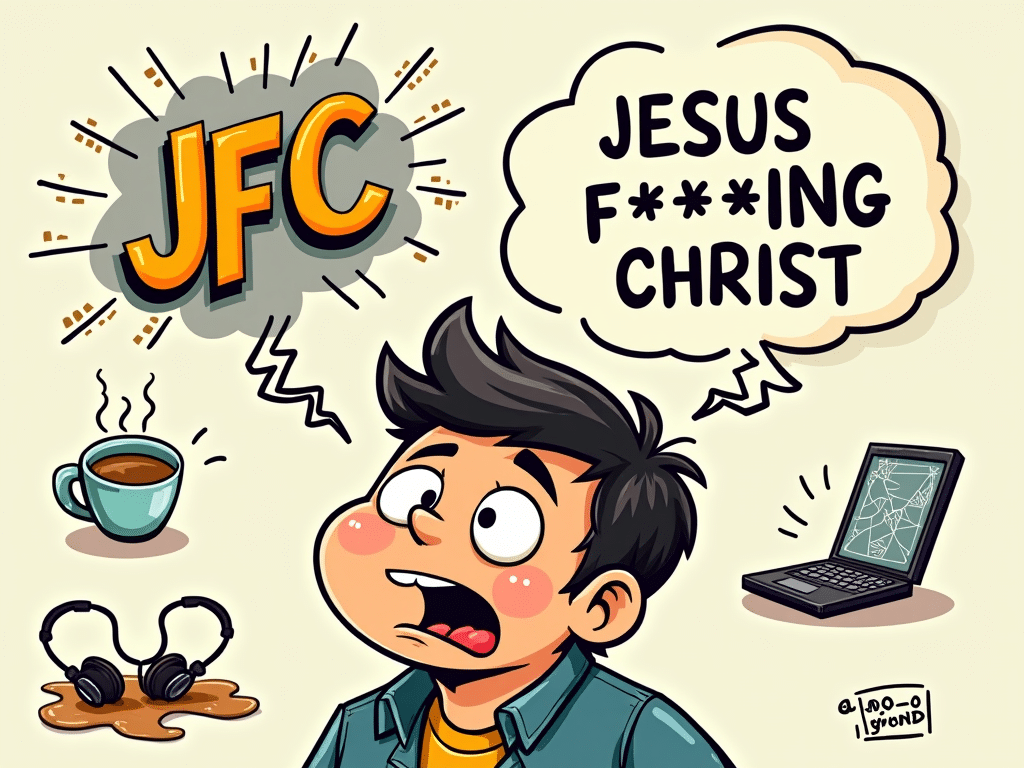JFC Meaning: The Ultimate Guide To This Internet Slang + Examples
Ever stumbled upon "JFC" online and felt completely out of the loop? You're not alone, and understanding this seemingly cryptic acronym is more relevant than you might think in today's digital landscape.
The internet, a vast and ever-evolving ecosystem of communication, has spawned its own unique language. Acronyms and slang terms pop up daily, some fading into obscurity as quickly as they appear, while others take root and become ingrained in online vernacular. "JFC" falls into the latter category, a prevalent, albeit potentially offensive, expression that's important to understand, even if you choose not to use it. Its critical to be aware of the nuance and context surrounding its usage. The intention behind using such slang shifts depending on the environment. To dissect its meaning, trace its origins, analyze its usage with relevant examples, and even delve into some surprising statistics, this article serves as your comprehensive guide.
| Category | Information |
|---|---|
| Full Form | Jesus F ing Christ |
| Type | Slang Initialism, Expletive |
| Primary Usage | Expressing strong emotions (shock, disbelief, frustration, anger, annoyance, emphasis) |
| Context | Informal (texting, social media, online forums); Generally considered vulgar and potentially offensive |
| Origin | Early 2010s, concurrent with increased internet culture prominence |
| Demographics | More commonly used by Millennials and Gen Z |
| Frequency | Approximately 3 out of every 100 text messages (according to Text Request data) |
| Alternatives | OMG, WTF, Holy Sht, other exclamatory expressions |
| Potential Interpretations (misunderstandings) | "Just F ing Cry," "Just Fing Care" (though these are rare) |
| Related Terms | Internet slang, acronym, initialism, expletive, vulgarity |
| Java Programming | Java Foundation Classes (less common meaning) |
| Reference Link | Pew Research Center |
At its core, "JFC" is an initialism, a string of letters representing a longer phrase. In this case, it stands for "Jesus F ing Christ." The use of asterisks, or other forms of self-censorship, reflects the vulgarity of the complete phrase. The term itself is an expletive, similar in nature to "OMG" (Oh My God) or "WTF" (What the F), used to express a surge of emotion. Understanding that the F word is a stand-in for the expletive is crucial to grasping the level of intensity it conveys.
- Vegamovies More Your Guide To Movies Streaming Now
- New Telugu Movies 2024 Watch Free On Movierulz Is It Safe
The primary function of "JFC" is to convey strong emotions, often negative ones. These can range from shock and disbelief to frustration, anger, or even extreme annoyance. Picture this: you're scrolling through social media and see a news headline about a shocking political decision. Your immediate reaction might be to type "JFC, I can't believe this!" In this scenario, "JFC" encapsulates your disbelief and frustration with the situation. Another use case: a friend texts you about their car breaking down for the third time this month. A simple "JFC, that's awful!" expresses your sympathy and acknowledges the frustrating situation.
However, the emotional spectrum isn't limited to negativity. "JFC" can also be used to express heightened excitement or amazement, albeit less frequently. For example, imagine receiving news that you've won a contest you completely forgot about. A surprised "JFC, I actually won?!" conveys your shock and excitement. But it is important to note that using this term in excited situations is considerably less common than using it to express more negative emotions.
Despite its prevalence online, "JFC" is undeniably a vulgar term, derived from a phrase considered blasphemous by many. Its use can be offensive, particularly in formal settings or when addressing individuals who are sensitive to such language. Therefore, understanding the context and your audience is paramount. A message containing "JFC" sent to your boss is highly inappropriate, while the same message exchanged between close friends might be perfectly acceptable. It all boils down to gauging the recipient's comfort level and the overall tone of the conversation.
Digital communication is the primary domain of "JFC." Texting, social media platforms (Twitter, Facebook, Instagram, etc.), online forums, and gaming chats are all common habitats for this acronym. Its conciseness makes it ideal for quick, impactful communication in these environments. Typing "JFC" takes significantly less time than spelling out the full phrase, making it a convenient option for expressing strong emotions in real-time conversations. However, its digital nature can also contribute to misunderstandings, as tone and intent are often lost in translation. Sarcasm, for instance, may not be readily apparent in a text message containing "JFC," potentially leading to misinterpretations.
To better grasp the nuance of "JFC," let's explore some specific examples: Scenario 1: A gaming context. A player makes a crucial mistake that costs their team the game. Another player might type "JFC, why did you do that?!" expressing their frustration and disappointment.Scenario 2: A social media post. Someone shares a post about a deeply disturbing news event. Comments might include "JFC, the world is going crazy!" indicating shock and despair. Scenario 3: A casual text message. A friend tells you they just got a flat tire on their way to an important meeting. Your response could be "JFC, that's the worst timing!" conveying sympathy and acknowledging their bad luck.
While "JFC" is the most widely recognized meaning, it's important to acknowledge other, albeit less common, possibilities. In the realm of computing, "JFC" can stand for "Java Foundation Classes," a set of graphical user interface (GUI) components for Java programming. However, outside of technical discussions, this meaning is rarely encountered. So, while context remains key, it's a safe bet that in most online interactions, "JFC" refers to the expletive.
The origins of "JFC" can be traced back to the early 2010s, a period marked by the rapid expansion of internet culture and the proliferation of social media. As online communication became increasingly commonplace, slang and acronyms evolved to meet the demand for concise and expressive language. "JFC" emerged as a shorthand for the already existing expletive, offering a quicker and potentially less offensive way to convey strong emotions. The initialism gained traction among younger demographics, particularly Millennials and Gen Z, who were early adopters of internet culture and digital communication.
Interestingly, the rise of "JFC" reflects a broader trend of using initialisms and abbreviations to navigate the complexities of online communication. These shortened forms allow users to express themselves quickly and efficiently, while also creating a sense of shared understanding within specific online communities. However, this constant evolution of language can also create a barrier to entry for those unfamiliar with the latest slang, leading to confusion and potential miscommunication.
While hard data on the specific usage of "JFC" is limited, some statistics offer insights into its prevalence. According to data from Text Request, "JFC" appears in approximately 3 out of every 100 text messages. While this may seem like a small percentage, it indicates a significant presence given the sheer volume of text messages sent daily. Furthermore, surveys conducted by the Pew Research Center suggest that "JFC" is more commonly used by Millennials and Gen Z individuals in text conversations, corroborating its association with younger demographics and digital communication.
The use of "JFC," like any form of slang, is influenced by various factors, including age, social group, and online community. Younger individuals who are more immersed in internet culture are more likely to use and understand "JFC" than older generations. Similarly, individuals who participate in online forums or gaming communities where such language is common are also more likely to encounter and use the acronym. Ultimately, the decision to use "JFC" is a personal one, based on individual preferences and the specific context of the communication.
The potential offensiveness of "JFC" cannot be overstated. The full phrase it represents is considered blasphemous by many Christians and offensive to those with strong religious beliefs. Using "JFC" in the wrong setting can lead to misunderstandings, hurt feelings, and even social repercussions. It's crucial to be mindful of your audience and the potential impact of your words, especially in professional or formal environments. Consider the context and your relationship with the recipient before using this acronym.
If you're uncomfortable using "JFC" or worried about causing offense, there are plenty of alternative ways to express strong emotions. "OMG" (Oh My God), "WTF" (What the F), "Holy Sh t," or simply typing out the full phrase with self-censorship are all viable options. You can also use more descriptive language to convey your feelings, such as "I can't believe it!" or "That's incredibly frustrating!" The key is to choose language that accurately reflects your emotions while remaining respectful of your audience.
It is essential to be aware of other languages where similar expressions may exist. For instance, in German, phrases that translate to similar exclamations of surprise, frustration, or disbelief are used, but a direct initialism equivalent to "JFC" is not necessarily common. Cultural nuances always play a significant role in the acceptability and usage of such expressions.
In conclusion, "JFC" is a vulgar slang initialism that stands for "Jesus Fing Christ." It's used primarily in digital communication to express strong emotions like shock, frustration, or disbelief. While it's a prevalent term in online culture, it's also potentially offensive and should be used with caution. Understanding the context, your audience, and the potential impact of your words is crucial before using "JFC" or any other form of slang. As language continues to evolve in the digital age, staying informed about these terms and their nuances is essential for effective communication.
The meaning of "JFC" from a girl is the same as from anyone else: it means "Jesus F ing Christ" and is used as an interjection to express annoyance or emphasize a feeling. It's a vulgar expression used in informal settings, particularly online communication. However, when a girl uses "JFC" while interacting with a guy, determining her intentions or feelings solely based on this acronym is impossible, and further context is needed.
There are, of course, more acceptable ways to phrase the sentiment behind "JFC." You could opt for "Jesus, Mary, and Joseph!" or a simple "Good heavens!" The goal is to convey the same level of surprise or frustration without resorting to potentially offensive language.
Ultimately, the decision to use "JFC" or not depends on your personal comfort level and the specific social context. It's a tool in the digital language toolbox, but one that requires careful consideration before deployment. Is it appropriate? Is it necessary? Is there a less offensive alternative? Asking yourself these questions can help you navigate the complexities of online communication and ensure that your message is received as intended.
- Telugu Movies 2024 Watch Online Rules Your Guide
- Kannada Movies Online Movierulz Streaming Where To Watch

"JFC" Meaning, Origin and Examples • 7ESL

JFC Meaning » Decode Internet Slang » SLANGINFO

JFC Meaning » Decode Internet Slang » SLANGINFO